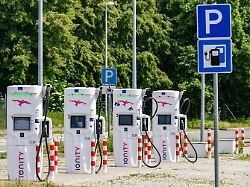Expected slump after boom
Every fifth new car in the EU has an electric drive
September 20, 2023, 4:26 p.m
In August, one in three newly registered cars was an electric vehicle. Stable supply chains and purchasing incentives ensure the big plus over the year. Because these are ending in this country, experts are expecting a significant decline in sales in the coming months.
In August, for the first time, one in five newly registered cars in Europe was an electric car. The driver of the development was Germany, as can be seen from figures from Manufacturers Association ACEA emerges. Compared to August of the previous year, registrations of electric cars in this country increased by around 171 percent – meaning that almost every third new vehicle on the road had an electric drive. However, the majority of new registrations came from commercial users. A total of 787,626 new vehicles were sold in the EU last month. This means that new registrations grew year-on-year for the 13th month in a row. The increase was 21 percent.
New registrations in the EU, the EFTA free trade area and Great Britain rose by 20.7 percent to 904,509 cars. Since the beginning of the year, the increase has been almost 18 percent. Most markets recorded solid growth in August, including the four largest: France grew by 24.3 percent, Germany even by 37.3 percent, in Spain sales increased by 7.8 percent and Italy recorded an increase of 11, 9 percent. In Great Britain the increase was 24.4 percent.
All German premium manufacturers were able to increase sales. The increase was particularly significant for the brands BMW (20.4 percent), Audi (23.6 percent) and Porsche (36.4 percent). The Volkswagen brand reported an increase of 8.7 percent in August, while the Mercedes brand increased by 4.0 percent.
“However, there is still a large gap to the pre-crisis level: compared to August 2019, there is an EU-wide decline of 17 percent,” said the consulting firm EY. Nevertheless, the figures in the otherwise weaker month of August show that the EU market is recovering from the material shortage last year, explained ACEA.
BDEW study: E-mobility has arrived in everyday life
However, the most popular drive last month was once again the petrol engine, even though the share of new registrations in the EU fell from just under 39 percent in the previous year to just under 33 percent. The second most popular choice among buyers in August was hybrid vehicles, which accounted for 24 percent of the market.
For the second time since June of this year, cars with purely electric drives were in third place in the ranking, ahead of diesel cars: e-cars had a 21 percent market share (165,165 units sold), while diesel vehicles had a market share of 12.5 percent were. Plug-in hybrids accounted for 7.4 percent.
“Electromobility has arrived in many people’s everyday lives,” explained Kerstin Andreae, chairwoman of the board of the Federal Association of Energy and Water Industries (BDEW), when publishing a Study on the subject of electromobility from a user perspective in Berlin. E-vehicles are not just for “technology enthusiasts”, but are now “absolutely suitable for everyday use”. The BDEW study shows that the view of e-car drivers in Germany towards charging continues to be positive, although the group of users is becoming increasingly broader The industry is on the right track and the expansion of the charging infrastructure is in full swing.
Expert: A rude awakening is imminent
The BDEW called on politicians to “clearly commit to the 15 million electric car target by 2030”. “With the current framework conditions, we will only have eight to ten million electric cars by 2030,” explained Andreae and demanded: “E-cars must be cheaper compared to combustion engines.”
Constantin Gall from EY meanwhile sees an end to the Europe-wide electric boom. On the one hand, Germany will no longer be a growth driver because commercial e-car purchases will no longer be subsidized this month. “On the other hand, we are also seeing the first signs of slowing momentum in some other countries,” added Gall. In August, 75 percent of all new registrations of electric cars in Germany were registered in the commercial sector. Gall expects a sharp decline here in the coming months.
In Gall’s opinion, private registrations should continue to increase until the end of the year, but then the subsidies for private buyers would also be further reduced. “The current boom will probably be followed by a rude awakening on the German market next year at the latest,” explained Gall.
